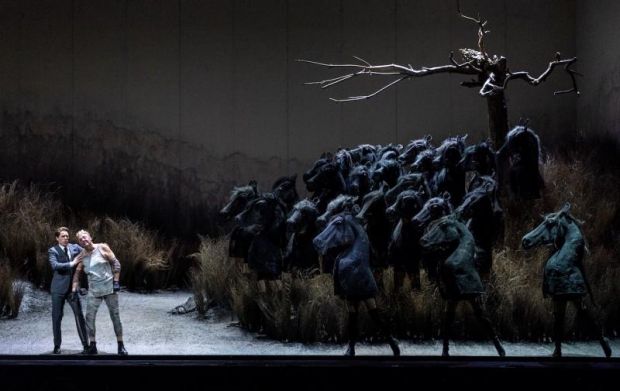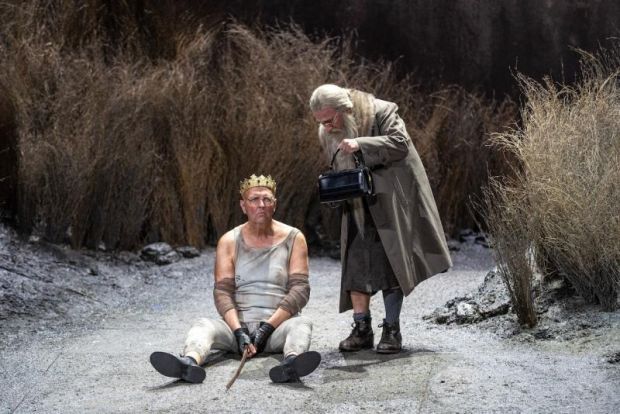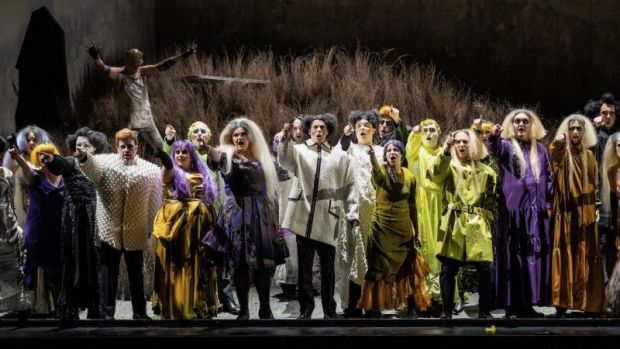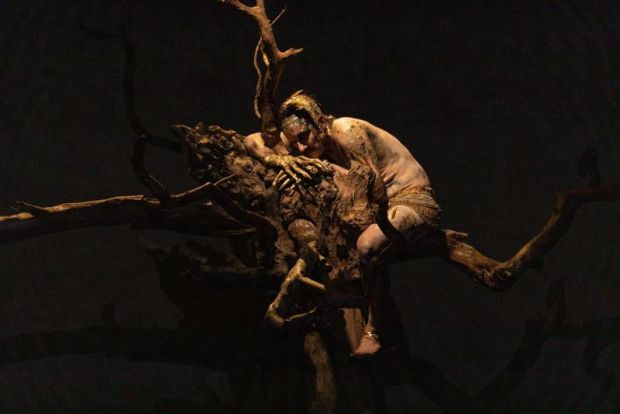The Golden Cockerel
The Golden Cockerel began its life as a poem by Alexander Pushkin in 1834, before becoming an opera written by Nikolai Rimsky-Korsakov, the last opera he completed before his death in 1908.
The opera tells the story of a lazy and gluttonous King who seeks advice from his sons, a general and finally an astrologer. The astrologer offers the King a golden cockerel with the power to foretell events and give warning in case of danger. However, even with the help of the bird, the kingdom goes to shambles and the bird eventually kills the king.
Since 1909 this opera has been presented many times before being given new life by director Barrie Kosky, and thanks to the collaboration between Festival d’Aix-en-Provence and Adelaide Festival.

Kosky sets this cautionary tale in a mysterious, grassland, undulating plain, only relieved by a gnarled, seemingly ancient tree used by the cockerel to keep guard. The grassland seems to blend into the sky and is reminiscent of the Nicholas Roerich style drops painted for the Ballet Russe near the turn of the last century.
Kosky’s world is desolate yet strangely confined thanks to the walls of the set and the pathways between and through the patches of grass, thanks to the stage design of Rufus Didwiszus, accentuated by the costume designs of Victoria Behr. We are in a world where bizarre half horse/half humans roam. Chariots that pay homage to H. R. Giger appear and heads roll aplenty. Kosky moves his singers through this landscape, creating powerful imagery and deeply drawn characters.
While visually spectacular, this production does lack in a few areas, the principal area being the lighting designed by Franck Evin. While the set is lit beautifully, the actors do not always fare as well and there were many times where the singers’ faces are virtually in darkness. This is a pity as we lose some of the subtext and the glorious costuming by Victoria Behr, particularly her gold dress for the Queen of Chemakha, who embodies Marlene Dietrich in her famous gold dress.

Arvo Volmer‘s orchestra (The Adelaide Symphony Orchestra) perfectly recreates the Rimsky-Korsakov score with its Sheherezade-like flourishes, soft intimate passages and grand opera bravado.
Otto Pichler’s dancing horses and prancing boys in shimmering silver are a delight and add comedy to tense moments.
Pavlo Hunka’s Tsar Dodon is a masterpiece of acting! On stage for the complete opera, his bass voice dominates the production as he takes us through a vast range of emotions from delusion to grandeur.
Venera Gimadieva’s Queen of Chemakha is ‘sex on a stick’. She is the Titania of this dream-like world and her scene with Tsar Dodon is reminiscent of the scene with Bottom in A Midsummer Night ‘s Dream. Her coloratura soprano voice soars as she manipulates her foe.
Andrei Popov’s Astrologer, a tenor altino, is the narrator of sorts and the creator of the fairy tale. His epilogue, complete with singing dismembered head, is unforgettable.

The two Tsareviches - Samuel Dundas and Nicholas Jones - in modern dress, dominate the first half of the opera, after which they remain slain and hung from the cockerel’s tree.
Mischa Schelomianski’s Polkan, the Tsar’s general, is played (as are the rest of the Tsar’s army) as a horse for comic effect. His rich bass voice, emanating from a horse, gives the character added irony.
Alexandra Durseneva’s Amelfa, the Tsar’s housekeeper, looking interestingly like Joan Crawford, added depth to the character of the Tsar in her scene utilising her velvety contralto voice.

The Golden Cockerel, performed by Matthew Whittet and voiced by Samantha Clarke, surveying all, perched on the ancient tree wearing one high heel like a discarded drag queen, provides the most memorable scene at the end of the opera, devouring the Tsar’s body with its long talons.
The Adelaide Festival Chorus, under the direction of Chorus Master Anthony Hunt, perform ‘under cover’ for most of the evening and as usual did not disappoint. They take us from high comedy to the stirring last chorus number with ease.
I must admit to finding the use of the Astrologer to cover act changes protracted and largely unsatisfying considering what needed to be done behind the curtain during the time taken.
The Golden Cockerel is an adventure for the senses, contains some amazing imagery and was enthusiastically received by the opening night audience, especially one very vocal Russian audience member!
Barry Hill
Photographer: Andrew Beveridge
Subscribe to our E-Newsletter, buy our latest print edition or find a Performing Arts book at Book Nook.

